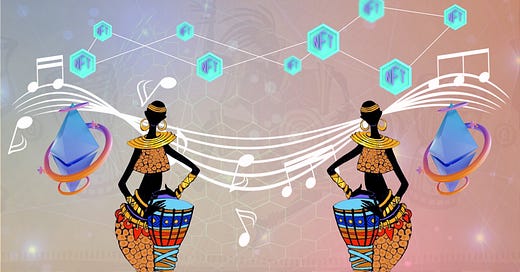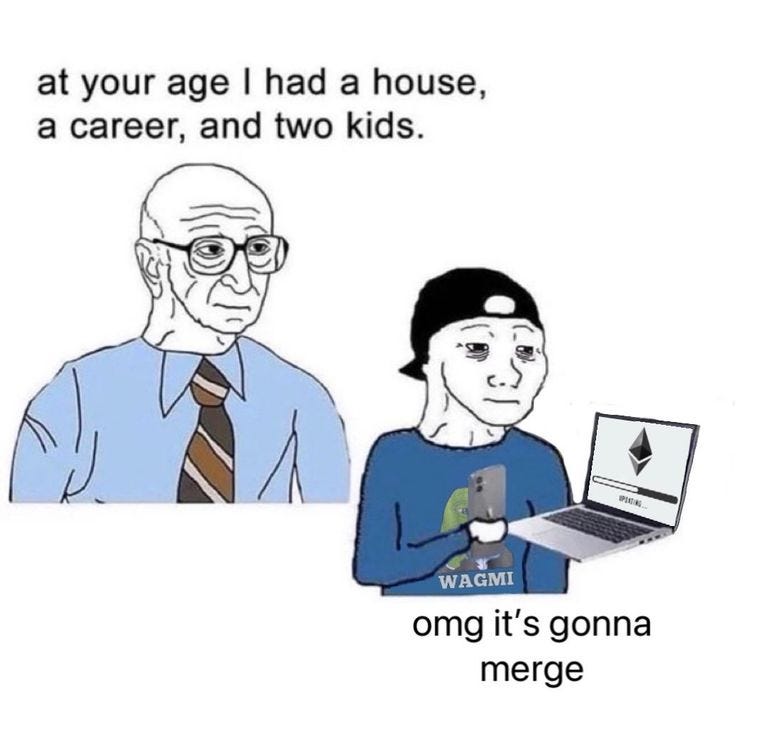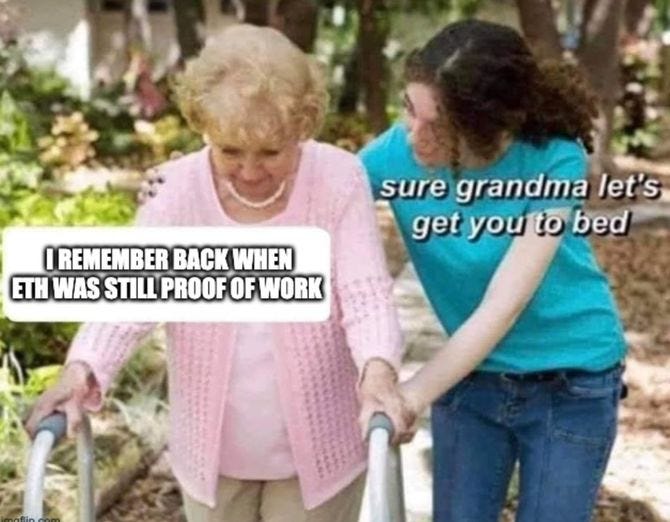How NFTS Can Help Preserve The History Of African Music | Bankless Africa Newsletter
This is Bankless Africa Newsletter, a newsletter that helps you stay up to date with well-curated news about crypto and Web3 around Africa.
Hey, Bankless fam!
The merge is finally here and just like Santa, it brought many good tidings to the people.
We will start this week off by first taking a look at NFTs, their rise in Africa, and how they can potentially be a tool of preservation for African music and a way to curb piracy issues plaguing African artists. Still on NFTs, big news as FIFA launches an NFT marketplace in partnership with Algorand.
More funding continues to stream into the continent with the goal of furthering crypto adoption, with the Bitmamas (the blockchain exchange platform which started as a WhatsApp group) raising close to a $1.65 million in a pre-seed round and Carry1st’s (a mobile game publisher) with a $20 million raise led by the collection of Alphabet, a16z & Others.
In this week's podcast episode, we spoke to Senator Ihenyen, the lead partner at Infusion Lawyers and sitting President of the Stakeholders in Blockchain Association of Nigeria on the different ways blockchain technology can potentially solve some of the problems plaguing Africa. Don’t forget to leave us a rating and review if you enjoyed it!
Mi kwabo (welcome in Fon)
Contributors: Angel Speaks, Vibrantty, Warrior, Starfly, SpiritedF, Miss Purple, Yofi
How NFTS Can Help Preserve The History Of African Music
Author: Angel Speaks

INTRODUCTION
Africa has fifty-four (54) independent countries, a population of about 1.37 billion people, a vast cultural heritage ranging from folklore, cuisine, teachings in the form of proverbs, dressing, medical practices, art, craft, music, and more. African cultures are generally recognized as separate from and distinguished quite distinctly from the rest of the world in diverse ways.
Every community’s cultural activity is rich in the cultural traits of that particular group/community. Africans tend to prefer oral culture over written form, this is said to come out of a fear that information could end up in the wrong hands, to then be used against us as a manipulative weapon. Whether this is true or not, music has unequivocally become a pivotal feature in the expression of multiple African cultures, it can be seen in a myriad of activities ranging from birth ceremonies to burial rites.
As the world evolves & progresses, the need to secure and preserve African music for posterity & cultural preservation increases. Fortunately, the technology and mediums that are necessary to front run this preservation is also simultaneously emerging.
One of these methods which are already in use is that of NFTs, specifically music NFTs.
WHAT ARE NFTS
Non-fungible tokens (NFTs) are assets that are found on a blockchain, they are governed by smart contracts, make use of unique identification codes and have a trackable ownership history which makes them relatively secure and difficult to tamper with. An NFT is non-fungible, which means it cannot be subdivided or substituted, it can however be transferred or traded from the original creator to a buyer/collector, who can also sell or transfer it as they wish. Typically, NFTs can be anything from digital artwork, videos, text, pictures, event tickets, domain names, and even real estate and music.
HISTORY OF NFTS
Recently, more people are beginning to get familiar with the concept of NFTs and their benefits from artwork & financial asset standpoint. In 2022, 81 percent of Americans have heard about and can define NFTs compared to a lesser 21 percent in 2021. As the awareness of this new blockchain use case increases, so do the sales; NFTs generated over 25 billion dollars in 2021, compared to a meager 92.9 million dollars in 2019. This rise in the adoption rate can be attributed to the increased popularity and curiosity surrounding the crypto scene and its related explorations.
The question remains, how did all of this begin and what was the aim?
In 2012, “Colored Coins” were minted on the Bitcoin blockchain to represent and manage real-world assets, give them uniqueness and prove ownership. This idea could not be fully realized due to some limitations but it laid the foundation for the future of NFTs. The first official NFT to be minted was known as “QUANTUM”, and it was created by Kevin McCoy in 2014.
Following these events, more people began to explore and create more NFTs, which eventually led to "The Year of the NFT" in 2021, this is when the use of smart contracts to house art & help form communities gained massive popularity. Some of the most financially valuable NFTs ever sold include CryptoPunk #6965, which sold for 800 Ethereum, CryptoPunk #4156 which sold at 650 Ethereum, Dragon CryptoKitties at 600 Ethereum, 12,600 square meters of land from Decentraland, were sold for 514 Ethereum, and the NyanCat sold for 300 Ethereum.
NFTS IN AFRICA
Africa is the second largest continent(in area and population) in the world but still lags behind when it comes to technological advancements. Only a few countries like Nigeria, Kenya, Ghana, and South Africa are currently able to take on the front lines in terms of the adoption of technology and its advancement. A study by Finder shows that Nigeria ranks as the 6th largest crypto adopter while South Africa ranks 12th.
The rise in the awareness of NFTs and their applications can be attributed to the massive adoption of cryptocurrencies in the past two years. Nigeria, the most crypto-curious country, comes in as the second nation after the Philippines with the highest number of people who know about NFTs.
Joseph Osinachi Igwe of Nigerian descent was one of the pioneering artists who adopted NFTs in its earlier days. He is recognized as one of the more prominent figures of NFTs in Africa, particularly as his work is so distinct, – he uses Microsoft Word for design - he became the first African artist to display an NFT series at Christie’s, a distinguished and very exclusive auction house in London.
Some other artists like Anthony Azekwoh, Odion Tobi, Oyindamola Oyekemi, Niyi Okeowo, Adisa Olashile, and Benjamin Aidoo continue to make their mark and have had their works minted on platforms like Opensea, Nifty Gateway, SuperRare, Wax, Mintable and several others for the world to see, appreciate and collect them.
MUSIC NFTS
When people hear of NFTs, art is inevitably the first thought that comes to mind, but as stated earlier, NFTs can theoretically be anything. Music NFTs are tradeable clips of music that allow people to listen to and own the music on the blockchain; some artists also include the stems of their music into the ownership of a specific NFT, which would allow a holder to create with them, giving them the power & opportunity to build on their NFTs.
Music producer and record label owner Don Jazzy collaborated with a digital artist who used his song as background music for 3 of his artworks, the collaboration generated three hundred thousand (300,000) dollars in ten minutes, evidence that the potential is there, but heavily underestimated. Fast-rising star Darvey Rucci prompted his colleagues to adopt music NFTs as he reckons they'll be used in favor of the traditional music industry in the coming times.
Hip-hop musician Anatii took South Africa by storm when he minted his latest single as an NFT on the Fair platform after removing it from all other traditional streaming platforms. He is urging musicians and creators to take charge of their art by eliminating the middlemen as much as they can. Another noteworthy African artist taking advantage of NFTs is PSIV, a young alte, afrobeat rapper who minted his song ‘SO SEXY’ on the Nina Protocol. On his Twitter page, he implores people to support musicians by buying their NFTs as it is a long-term investment into the artist’s journey.
Other artists known by their usernames on Twitter as zanibwaves, wisdomtrust4eva, MercuriMedici, Dedeukwu, and Mansa_nova from different parts of the African diaspora have minted their works on different platforms, these endeavors continue to promote African music around the world.
HOW MUSIC NFTS HELP PRESERVE AFRICAN MUSIC
Music NFTs are extremely beneficial to artists as they provide a platform for African music to be heard, widely enjoyed, and recognized. Most NFT marketplaces have a free “entry and exit” protocol; the platforms are often open for all to view, appreciate and eventually invest in the artists of their choice. With the innovation of music NFTs, Africans can mint their works (both ancient and modern), to gain traction and recognition.
The earlier works of old African artists, both alive and dead if appropriate permission is acquired, can be minted as NFTs to help secure and protect their music from further piracy and inevitable degradation. NFTs being built using blockchain technology offer a transparent and accessible record. For most NFTs, there can only be one owner at any time, so the provenance of a specific piece cannot be questioned, the risk of copyright infringement is much lower. NFTs are able to save or preserve whatever content they have been assigned from being exploited through this transparent provenance system, as origin and creator will always be recognized.
With the real-world benefits that NFTs currently offer, people are coming closer to appreciating and connecting with African music in real-time. When NFTs are sold, holders are able to gain access to individual artists and get to know their work's thought processes and inspiration in ways that have never quite been possible. People who buy NFTs may in some cases also be granted access to discounted tickets for specific shows where the artist could be performing.
For anything to be preserved, it must have value. When people purchase music NFTs, they add that value to the work while not being left out of the evolution of the artist behind it. When one purchases an NFT, they gain both a culturally significant value and possibly a monetary value if they ever realize a profit from a resale. The fact that royalties are also allocated to the original creator when the piece is resold is a big drawing point, particularly in the music space where musicians continue to fight for royalties that they so dearly deserved. This could change how the entire music landscape handles music and its creators.
CONCLUSION
NFTs pose potentially huge benefits for Africans and the world at large, but despite the adoption and the increasing interest in this use of blockchain technology, there are still some difficulties creators face. The anti-crypto regulations in many African countries, the shortage of African collectors, the lack of global recognition, and inordinate gas fees can cause a strain on how much we are able to achieve as a community within the NFT space.
As the world evolves, it is pertinent that we develop along with it as well, by adopting new technologies and seeking new ways to do things that proffer lasting solutions for us as one of the most culturally diverse communities. Taking advantage of NFTs could prove to be a step in the right direction as it seeks to improve the quality of our lives and our businesses while providing the opportunity to own that evolution, it allows us to take charge of our own cultural evolution.
🏴 Inside Bankless Africa
Listen To The Newest Episode Of The Bankless Africa Podcast
Like, Share, Retweet, and Subscribe to our podcast.




📰 News & Opinion In and Around Africa
Nigerian blockchain payments startup Bitmama closes a $2M pre-seed round
Author: Tage Kene-Okafor
A blockchain startup, Bitmama, has raised a pre-seed extension of $1.65 million adding to the $350,000 they have received previously, closing the round at a gross $2 million. The startup began as a WhatsApp group through which to learn about cryptocurrency and the facilitating of peer-to-peer transactions. They has since evolved into a crypto exchange platform which allows users to access virtual assets and other benefits such as peer-to-peer transactions.
Lately, the company introduced Changera, a social payment solution allowing customers to use stablecoins to facilitate remittances and international payments on Amazon & Netflix via virtual cards. The startup claims that the Changera virtual debit cards are funded with stablecoins, have over $10,000 in monthly spending limits and can work globally for online transactions.
Bitmama plans to use the pre-seed funds to expand its operational base, strengthen its team, integrate its product offerings, and plot its market penetration across Africa
Crypto Exchange LBank Targets African Cryptocurrency Market
Author: Ryan McNamara
Crypto exchange LBank launched its Crypto Accelerator Program in partnership with Adanian Labs, a Kenya-based tech investment and accelerator lab. Since the launch, LBank has helped onboard 17 new cryptocurrency projects, offering mentorship and guidance to developing Web3 projects in Africa. The growth of LBank has been quickened by an increased interest in the cryptocurrency space in Africa and some initiatives rolled out by the LBank and its partner ventures. One of its partners, Adanian Labs, has grown vastly throughout Africa. The firm has established its presence in many African countries including Nigeria, Tanzania, Zambia, and South Africa.
Aiming to generate interest in the technological exploration and innovation fronts, LBank has scheduled a series of monthly educational meetups across Africa called “LBank and Adanian Crypto Days”. The meetups will facilitate networking and partnerships in the African tech community, especially in the Web 3 space.
Local Game Publisher Raises $20M By Alphabet, a16z & Others.
Author: eGamers.io
Carry1st is one of the mobile game publishers in Africa that is setting itself up to absorb and onboard the next 300 million internet users that are expected to enter the space.
With an investment of $20M having been received from a16z and Alphabet, Carry1st could become the leading game publisher across the continent. What Axie infinity did for the gaming industry in the Philippines showed that play-to-earn could be an avenue through which the gamers can earn a reasonable living.
This investment could be very beneficial in encouraging product development expansion across Africa, which is shaping up to be a continent that promises growth and a huge number of potential play-to-earn gamers whose lives could be changed forever.
Africa urges lawyers to explore digital assets & the cryptocurrency industry
Author: Henry Ojelu
A workshop was held in Lagos tagged “Digital Assets And Crypto Currency: Legal & Cyber Security Issues”, it was organized specifically for lawyers in Nigeria.
Several speakers at the workshop urged lawyers to not just rely on litigation and court appearances as their only areas of practise but to also explore the digital asset and the cryptocurrency industry as it is a massive opportunity for expertise diversification.
In addition, according to PUNUKA attorneys, the digital asset and cryptocurrency industry is a reality that everyone must accept as Nigerians (according to available data) are some of the top cryptocurrency users in the world.
Ghana set to host maiden Africa Bitcoin Conference
Ghana will hold the first Maiden Africa Conference (ABC) from the 5th of Dec to the 7th of Dec 2022. The expected attendees are Bitcoin enthusiasts, technologists, investors, humanitarians, educators, advocates, and artists from Africa. The conference location is set to be the Kempinski Hotel in Accra.
The conference will feature keynote addresses, presentations, panel discussions, workshops, exhibitions, hackathons, and many more interesting activities.
The Maiden ABC is expecting around 800 attendees, this includes CTOs, Heads of Innovation and Technology, IT directors, developers, start-ups, OEMs, members of the government, automotive, technology providers, investors e.t.c.
🥷🏾 Airdrops Hunter

📚 Learning Centre
What are CBDCs? A beginner's guide to central bank digital currencies
Author: Cointelegraph
Central Bank Digital Currencies are virtual currencies backed and issued by a central bank, recent events like the covid 19 pandemic and the global adoption of cryptocurrencies have made a case for the importance of access to digital currencies on a global scale. In response, leading nations like China and the United States have invested in research initiatives on CBDCs to learn about the different types of CBDCs and the difference between Bitcoin and CBDCs
🇰🇪 ETH SAFARI
You're not going to want to miss out on this event!
ETH Safari is the first Ethereum Conference and Hackathon of its kind in Africa; it promises to be an unforgettable experience for anyone who wants to learn more about blockchain technology.
Save the dates as it is happening this week on the 18-24 September 2022 in Kenya!
The conference will have a hackathon with impressive prizes and there will be talks by local, regional, and international speakers in Web3.
Buy your ticket today and join the Bankless Africa x ETHsafari Telegram group— we look forward to seeing you there!
😂 Meme Humour
Thank you for subscribing to the Bankless Africa Newsletter.
Follow Bankless Africa: Website, Twitter, Instagram, YouTube, Telegram, and LinkedIn.
Was this email forwarded to you? Subscribe on Substack.






